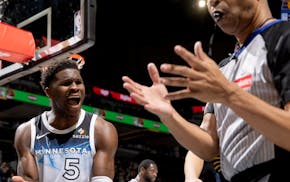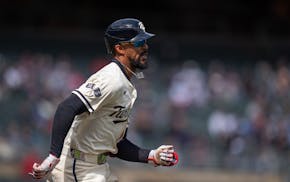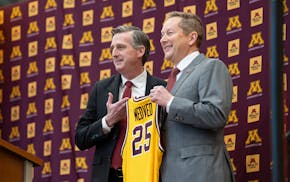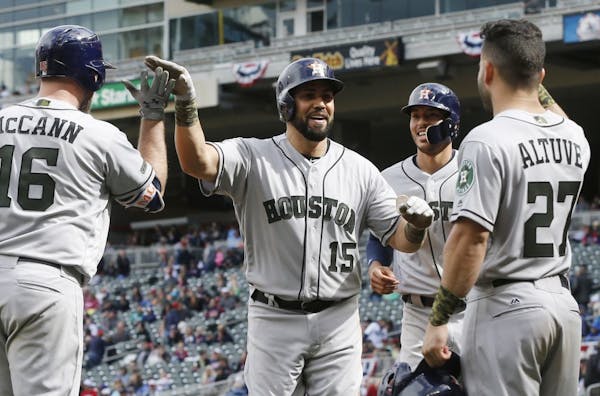Ervin Santana took the mound in the seventh inning Monday having thrown 103 pitches. He had survived a stressful sixth but he wanted to keep going against Major League Baseball's best team.
Santana needed only 11 pitches in the seventh and left with an 8-2 lead over Houston. Too bad Big Erv doesn't have a 200-pitch limit.
"Just trying to do the most that I can to stay in the game," Santana said. "I know our bullpen is tired."
That's putting it kindly.
Twins manager Paul Molitor chose a fatigued bullpen over two emergency call-ups one day after a 15-inning marathon, and the result was disastrous.
Handed a six-run cushion, the bullpen melted down in the most horrific, historic way imaginable to ruin a feel-good bounce-back performance at Target Field.
The relievers gave up two touchdowns over the final two innings as the Astros pulled a rabbit out of a hat with a 16-8 win.
The bullpen's stat line looked like something out of youth in-house baseball: 14 runs, 13 hits, two home runs, three walks, a hit batter and a partridge in a pear tree.
"It was embarrassing," said Ryan Pressly, who managed only one out while giving up five runs.
In sports there are bad losses and there are really bad losses. This one deserves a category of its own.
The Astros arrived with the best record in baseball. The Twins were coming off a disheartening 8-6 loss to Tampa Bay in the longest home game in team history — 6 hours, 26 minutes.
For seven innings, the Twins penned an upbeat narrative about moving past a tough loss. And then they drop-kicked that to oblivion and made history again. Undesirable history.
The 14 runs allowed by the bullpen set a franchise record. Accomplishing that feat in only two innings seems practically impossible.
A 15-inning loss felt like a walk in the park compared to the misery of blowing a six-run lead and getting doubled up in two innings.
"It's a hard one," Molitor said.
Molitor opened himself to criticism with his use of the bullpen, which he acknowledged was "a little bit taxed" after Sunday's endurance test. The team had called up Drew Rucinski and Jason Wheeler on Monday morning as reinforcements.
Wheeler had a scheduled start Monday for Class AAA Rochester, so he was fresh. Rucinski threw 31 pitches Saturday but was available.
Molitor showed no faith in either pitcher needing only six outs to protect a six-run lead. Instead, he gave first crack to Pressly, who was pitching for the third time in four days. He gave up five runs on three hits.
Next up: Craig Breslow, who threw 25 pitches the previous day, his second-highest total this season. He gave up three runs in one-third of an inning on Monday.
Next up: Matt Belisle, who had thrown 30 pitches Sunday, his highest pitch count of the season. He also gave up three runs in one-third of an inning.
The 11 runs allowed in the eighth inning by that trio were the most by the Twins in one inning since 2007.
Why even bring up fresh arms if they don't trust them in that situation?
"You're going to go with your experience and guys that you feel should get people out," Molitor said.
Rucinski got his chance in the ninth with the life already sucked out of the ballpark. He failed miserably too, giving up three more runs for good measure.
The relievers were both bad and unlucky. Center fielder Byron Buxton left in the sixth inning after suffering a cut on his right ring finger when he touched Eddie Rosario's cleat while trying to make a diving catch. Rosario made a sliding catch behind Buxton.
Buxton's absence proved costly during that 11-run inning.
Two balls hit to the outfield that could have been caught — one by emergency left fielder Ehire Adrianza and one by Rosario in center — fell for hits and four runs scored, giving the Astros a 9-8 lead. They kept circling the bases.
Who knew a 15-inning game would be the second-weirdest outcome of the weekend.
Chip Scoggins • chip.scoggins@startribune.com

Scoggins: Wolves must call on calm when the whistles favor the Lakers

Scoggins: After a sleepy start to the season, Twins are showing signs of life
Scoggins: Williams Arena needs to get a piece of its history back

Scoggins: What you think you know about Chris Finch isn't close to who he truly is


